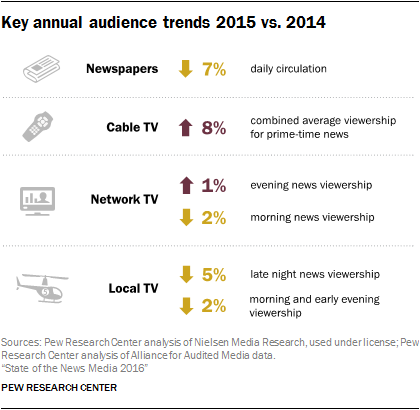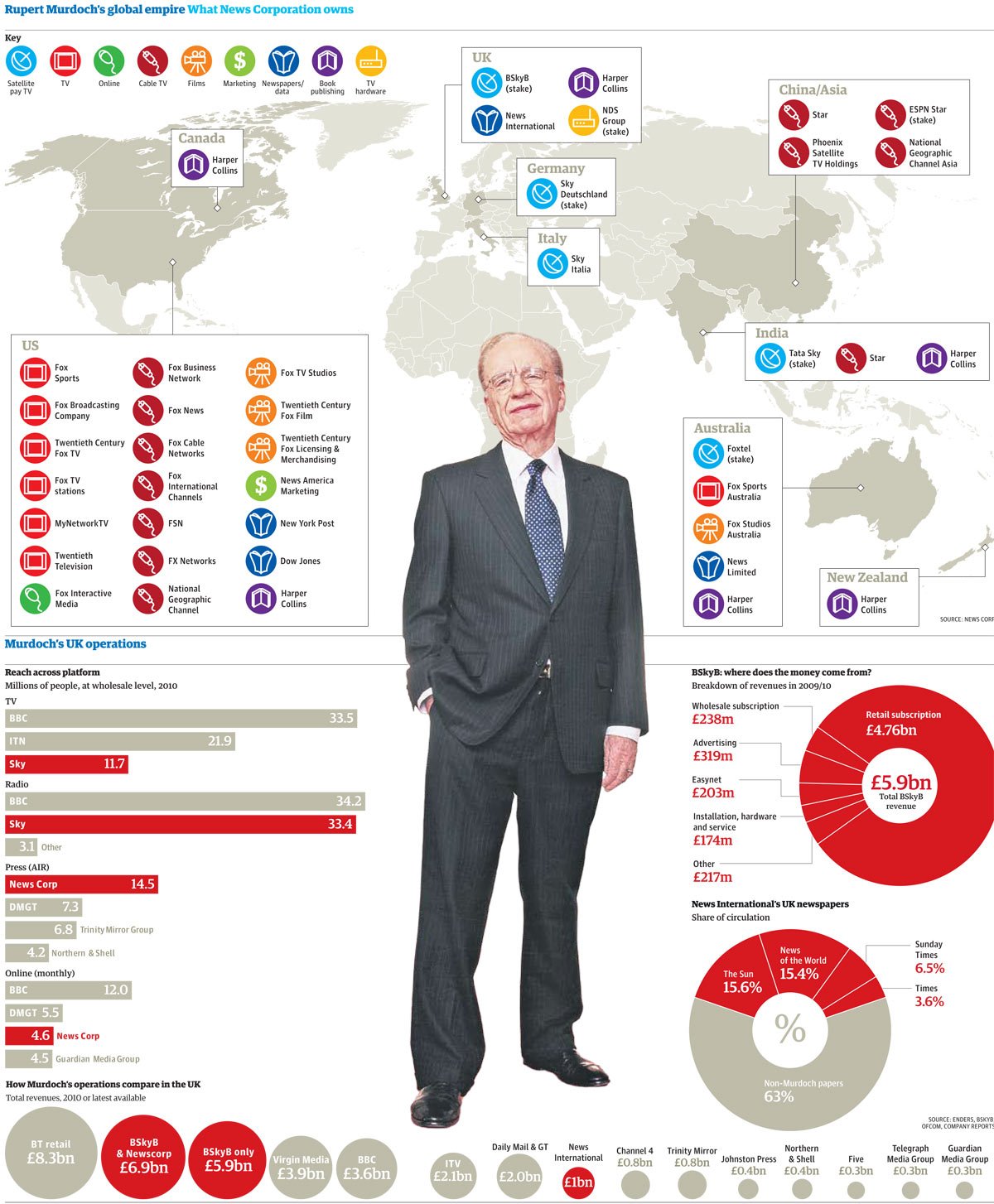I love long reads. In-depth long-form articles that talk about stuff that matter. In fact, I hunt them and have a special folder for them. (If you’re interested in them, check this)

So you can imagine my dismay when I came across the Pew Research Center’s THE STATE OF THE NEWS MEDIA 2016 REPORT.
It’s a 17page read and if you’ve got the time to dive in the rabbit hole. You can check it here:
However, here are a few takeaways:


In simple terms, these images means the main sources of quality reporting are dying. And this has a potential damage for us as a society.
Journalism’s crucial role in helping democracy function is sometimes forgotten amid the clamor of partisan debate and the messy nature of the news business.
Investigative Journalism
Investigative journalism is a form of journalism in which reporters deeply investigate a single topic of interest, such as serious crimes, political corruption, or corporate wrongdoing.
An investigative journalist may spend months or years researching and preparing a report. Investigative journalism is a primary source of information.
ELI5:
investigative reporting—uncovering wrongdoing through documents, data, interviews, and occasionally, undercover methods
The above definitions clearly show the huge benefits investigative journalism contributes to the society.
An investigative journalist:
Scrutinizes government and business practices and their effects on the society at large. This is done through:
Analyzing documents, such as lawsuits and other legal documents, tax records, government reports, regulatory reports, and corporate financial filings
Numerous interviews with on-the-record sources as well as, in some instances, interviews with anonymous sources (for example whistleblowers)
By doing this, investigative journalists keep governments and businesses in check. This, in fact, might be one of the reasons for their gradual demise…..stepping on the toes of the “too big to found guilty” corrupt entities.
Some important investigative journalism successes:
1971: The Pentagon Papers leaked and published by a military analyst named Daniel Ellsberg. He leaked a seven-thousand-page history of U.S.-Vietnam relations that had been prepared for internal use by the Pentagon.
2012: Charles Duhigg and his team’s Pulitzer’s prize winning research on The iEconomy….
As a direct result of the Times series: More than a million workers at the Chinese factories that make Apple’s iPhones and iPads got 25 percent raises. Their working conditions vastly improved after Apple’s supplier plants were opened to outside inspections for the first time.
2013: The Washington Post and The Guardian report on NSA surveillance
2014: Glenn Greenward and The Guardian team's work on the Edward Snowden whistle-blowing efforts. Their efforts also won the 2014 Pulitzer Prize for Public Service…
The most recent of these successes is the work of the International Consortium of Investigative Journalists publishing:
The Panama papers
A Giant Leak of Offshore Financial Records Exposing A Global Array of Crime and Corruption
Millions of documents showing how heads of state, criminals, and celebrities use secret hideaways in tax havens
Journalism isn't dying because it is in its nature. Journalism is dying because it is being murdered
One of the major conclusions of the 2016 report is that the media industry is dying. Profits are dwindling and companies are filing bankruptcy or being merged.
An aftermath of this is the gradual death of Journalism as a whole and investigative journalism to be specific.
It is being sped along by politicians that have sought to close the mind of the public. It has been abetted by executives that have snatched up portfolios of newspapers as though they were trading cards, who liquidate jobs for bonuses but blame the company's financial struggles on employees.
There are numerous examples online to buttress how bad it has become:
The journalist who lost his editor job in a media company and had to settle for a bland blog posts writing job in Hubspot --see his book Disrupted: My Misadventure in the Start-Up Bubble.
Pulitzer Prize-winning Rob Kuznia went to work in PR in order to make ends meet
More importantly, a special report by the Index on Censorship magazine: Danger in Truth: Truth in Danger reveals several techniques that are being used to stop journalists from covering the news and finding the truth. From being tagged as extremists to physically assaulted, journalists (esp investigative journalists) are fast becoming endangered species and truth is danger…..
There are two major reasons why I believe we’re witnessing the death of investigative journalism
THE RISE OF MEDIA CONGLOMERATES
In 2010, I vowed I was always going to take any news item on the media with a pinch of salt. Why?
TheGuardian published an article detailing how Rupert Murdoch’s media conglomerate control over a fifth of UK news consumption. Now these are not a collection of small regional companies….. Murdoch companies include News Corp and Sky. Media giants in their own individual right.


Also, a 2012 research reveals that 6 Media Corporations control 90% of the Media in America.
Here are a few snippets:


Investigative journalists are usually subjected to harassment in their search for the truth. And on occasions where their findings might cause potential damages to the Media owners and their political allies. Such researches are killed and never see the light of the day.
THE INTERNET
In the 21st century, there is a certain fate that befalls all traditional structures- big companies who deem themselves “too big to fail”… They are “innovated away”….
One of the highlights of the State of The Media 2016 report is the rise of Social Media sites and other websites as the primary source of the internet.
Traditional media sources are to be solely blamed for this. There are several reports that show that they all had the first mover opportunity to embrace the internet and its attendant technologies…. Instead, they fought against it and put in place obstacles that would inhibit the spread on the web. And they failed. Woefully.
It’s saddening that it’s when faced with dwindling profits that traditional news media are now embracing social media….
With dwindling profits, research projects are being stopped and journalists are being retrenched or sacked.
The industry supports nearly 33,000 full-time newsroom employees. Indeed, newspapers employ 32% of daily reporters stationed in Washington, D.C. to cover issues and events tied to Congress, as well as 38% of the reporters who cover statehouse legislatures. Still, smaller budgets have continued to lead to smaller newsrooms: The latest newspaper newsroom employment figures (from 2014) show 10% declines, greater than in any year since 2009, leaving a workforce that is 20,000 positions smaller than 20 years prior. And the cuts keep coming: Already in 2016, at least 400 cuts, buyouts or layoffs have been announced. Ownership trends show further signs of devaluation as three newspaper companies – E.W. Scripps, Journal Communications, and Gannett – are now one. And the recently renamed Tribune Publishing Co. spent much of the spring of 2016 fending off an attempt by Gannett to purchase them as well.
Social Media 2.0 Behemoths invest so little in boosting research and yet, still decide who gets paid… FACEBOOK, GOOGLE, TWITTER, AND PINTEREST ARE THE NEW KINGMAKERS …
It has been evident for several years that the financial realities of the web are not friendly to news entities, whether legacy or digital only. There is money being made on the web, just not by news organizations. Total digital ad spending grew another 20% in 2015 to about $60 billion, a higher growth rate than in 2013 and 2014. But journalism organizations have not been the primary beneficiaries. In fact, compared with a year ago, even more of the digital ad revenue pie – 65% – is swallowed up by just five tech companies. None of these are journalism organizations, though several – including Facebook, Google, Yahoo, and Twitter – integrate news into their offerings.
The remaining journalists are forced to compete for a finite number of eyeballs focusing on quantity over quality.
There are various reports where journalists have been forced to compromise the truth to boost sensationalism.
CLICKBAIT NEWS ARTICLES HAVE TAKEN OVER AND QUALITY REPORTING IS DYING
Media outlets care more about driving ad revenue/profits, and get that by running listicles, clickbait, celebrity news, etc. rather than paying people to take lots of time to research and write lengthy, serious articles about important issues
There Might Be a Way Out… And Why I Think There’s Hope
It's not all doomy and gloomy, though. And all hope is not lost. A recent study by TheGuardian shows that some high-quality investigative reporting is ongoing. A very good example is a story by Mariah Blake: Welcome to Beautiful Parkesburg, West Virginia. Home to one of the most brazen, deadly corporate gambits in U.S history
WHAT Do THESE TWO INDUSTRIES BOTH HAVE IN COMMON?
THE BOOK INDUSTRY
FILM PRODUCTION
They were innovated away by the Internet. And despite having the first mover advantage, they scuttled it and wanted to inhibit its growth so as to maintain their gatekeepers status.
At the end, innovation and the Internet won:
Self-publishing saved the book industry and authors
Indie crowd-funding saved great products and film production
And even on Steemit, we’re having the launch @pharesim’s PEVO –.a decentralized long-term digital archive for scholarly publishing through the open access paradigm and a web platform facilitating continuous open evaluation.
We even have a Ph.D. dropout who is moving her research to Steemit.
IF THE INTERNET IN A WAY KILLED INVESTIGATIVE JOURNALISM, THEN STEEMIT AS A DECENTRALISED PLATFORM CAN/SHOULD SAVE IT TOO
Making Steemit A Journalism Hub
Investigative journalism is very expensive. Journalists not only risk their lives but also spend weeks, if not months, traveling, lodging in hotels and seeking and sometimes, paying sources.
These expenses run into thousands of dollars….and we might not be able to properly fund them on Steemit.
However, they can use the platform for:
Full publications when the magazine they publish in wants to remove parts
For republications
It could be even used by whistleblowers and their journalist partners
Or a sort of “indie” projects that are not too expensive to produce.
H.T : @phareism
They (investigative journalists) do what they love without force or fear. We support them and get what we want- quality unbiased reporting on issues that affect us as a society
A win-win situation for both parties.
Over to you:
The main goal of this post is to encourage discussions about the state of journalism in general. The truth is truly in danger and we all have a part to play in ensuring it lives.
Do you have suggestions on how journalists can be invited to try out the platform? Would love to hear from you.
Sources:
https://en.wikipedia.org/wiki/Investigative_journalism
http://www.journalism.org/2016/06/15/state-of-the-news-media-2016/
http://www.eurekalert.org/pub_releases/2016-07/s-tii070716.php
http://ioc.sagepub.com/content/45/2/6/F1.expansion.html
https://www.sciencedaily.com/releases/2016/07/160710212814.htm
http://ioc.sagepub.com/content/45/2/6/F1.expansion.html
http://trofire.com/2015/08/30/corporate-america-thought-it-killed-investigative-journalism-wrong-huff-post-intercept-and-other-social-media-are-now-here/
https://www.reddit.com/r/explainlikeimfive/comments/3vbs2j/eli5_why_is_investigative_journalism_considered/
https://revisionworld.com/a2-level-level-revision/sociology/mass-media-0/ownership-and-control-media
http://www.huffingtonpost.ca/dave-yin/journalism-isnt-dying_b_9043884.html
https://www.theguardian.com/media/organgrinder/2010/dec/30/murdoch-to-control-22percent
http://www.usatoday.com/story/money/business/2015/06/11/what-rupert-murdoch-owns/71089066/
http://www.brookings.edu/blogs/brookings-now/posts/2014/10/ten-noteworthy-moments-in-us-investigative-journalism
http://ioc.sagepub.com/content/current #steemit
http://www.businessinsider.com/these-6-corporations-control-90-of-the-media-in-america-2012-6
https://media.illinois.edu//knight/future-of-investigative-reporting
